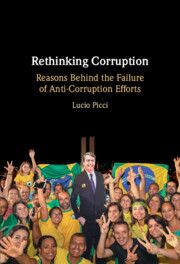Rethinking Corruption
Why have anti-corruption efforts often failed? Current thinking on corruption has largely overlooked the profound implications of its contested nature, which paradoxically makes it an effective yet highly dysfunctional 'tool of government.' As a tool of government, it helps execute policies and guarantees a degree of political order. Moreover, anti-corruption measures are wielded as political instruments, strategically embraced by governments and oppositions to further their respective agendas. Based on an analysis of Russia, Brazil and the United States, Rethinking Corruption takes a fresh look at corruption and critiques the prevailing view of anti-corruption policies. Embarking on a captivating journey through these countries, this book encompasses the notion of legal corruption and invites a comprehensive reconsideration of corruption, with a focal point on questions of economic and political equality.
- Provides three detailed country case studies that is only partly of a comparative nature
- Looks at corruption 'from a distance' and an unconventional way
- Is multi-disciplinary
Reviews & endorsements
‘thought-provoking … provocative … Recommended.’ J. Albanese, Choice
Product details
February 2024Hardback
9781009468800
270 pages
235 × 158 × 22 mm
0.54kg
Available
Table of Contents
- Part I. Laying the Groundwork:
- 1. Introduction
- 2. The consensus on corruption
- 3. The mutual shaping of measures and concept
- 4. Of causality and historical junctures
- 5. What we talk about when we talk about corruption: some methodological considerations
- Part II. Three Case Studies:
- 6. The carrot and the stick: systemic corruption in Russia
- 7. Corruption as the glue of the system: the case of Brazil
- 8. Legal corruption in the United States of America
- Part III. Rethinking Corruption:
- 9. Legal corruption and other societal geographies
- 10. A problem of control: corruption is a tool of government
- 11. Fighting corruption, fighting for corruption
- 12. Conclusions: whither corruption?.



